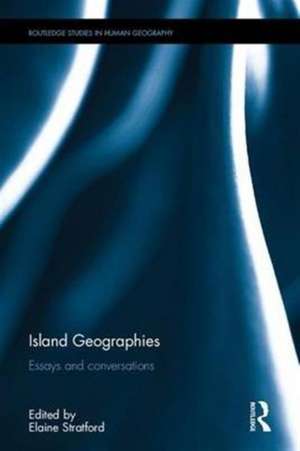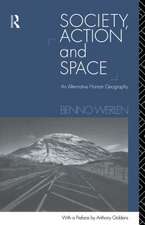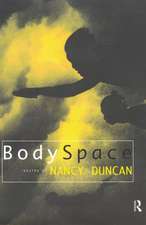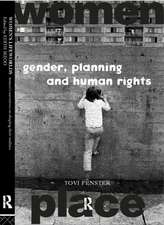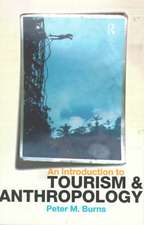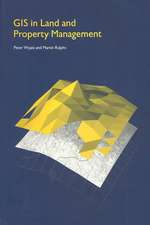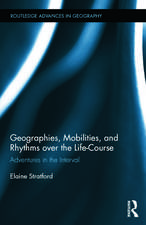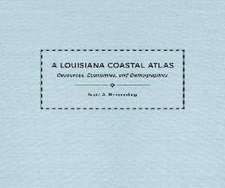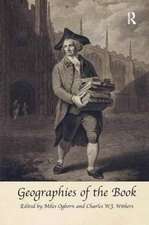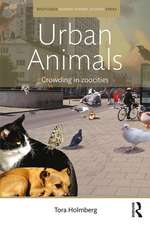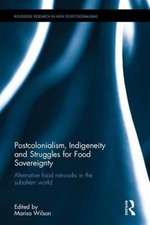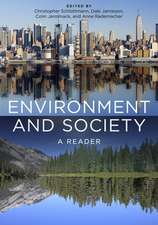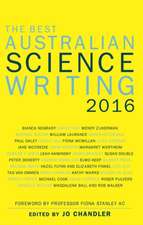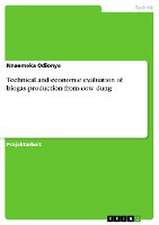Island Geographies: Essays and conversations: Routledge Studies in Human Geography
Editat de Elaine Stratforden Limba Engleză Hardback – 3 noi 2016
Toate formatele și edițiile
| Toate formatele și edițiile | Preț | Express |
|---|---|---|
| Paperback (1) | 416.22 lei 6-8 săpt. | |
| Taylor & Francis – 14 aug 2018 | 416.22 lei 6-8 săpt. | |
| Hardback (1) | 596.79 lei 6-8 săpt. | |
| Taylor & Francis – 3 noi 2016 | 596.79 lei 6-8 săpt. |
Din seria Routledge Studies in Human Geography
-
 Preț: 332.18 lei
Preț: 332.18 lei -
 Preț: 371.71 lei
Preț: 371.71 lei -
 Preț: 334.09 lei
Preț: 334.09 lei -
 Preț: 341.09 lei
Preț: 341.09 lei - 18%
 Preț: 1057.75 lei
Preț: 1057.75 lei - 18%
 Preț: 1072.71 lei
Preț: 1072.71 lei - 16%
 Preț: 299.87 lei
Preț: 299.87 lei -
 Preț: 490.62 lei
Preț: 490.62 lei - 28%
 Preț: 823.63 lei
Preț: 823.63 lei - 18%
 Preț: 1058.79 lei
Preț: 1058.79 lei - 18%
 Preț: 1054.71 lei
Preț: 1054.71 lei - 17%
 Preț: 296.11 lei
Preț: 296.11 lei - 18%
 Preț: 1057.89 lei
Preț: 1057.89 lei - 28%
 Preț: 822.76 lei
Preț: 822.76 lei - 18%
 Preț: 732.06 lei
Preț: 732.06 lei -
 Preț: 414.32 lei
Preț: 414.32 lei - 18%
 Preț: 1062.98 lei
Preț: 1062.98 lei - 18%
 Preț: 702.31 lei
Preț: 702.31 lei - 18%
 Preț: 1057.09 lei
Preț: 1057.09 lei - 18%
 Preț: 1169.66 lei
Preț: 1169.66 lei - 18%
 Preț: 1114.98 lei
Preț: 1114.98 lei -
 Preț: 407.40 lei
Preț: 407.40 lei -
 Preț: 419.50 lei
Preț: 419.50 lei - 28%
 Preț: 823.08 lei
Preț: 823.08 lei -
 Preț: 373.59 lei
Preț: 373.59 lei - 5%
 Preț: 353.14 lei
Preț: 353.14 lei - 18%
 Preț: 1055.06 lei
Preț: 1055.06 lei - 18%
 Preț: 1058.69 lei
Preț: 1058.69 lei - 18%
 Preț: 1065.06 lei
Preț: 1065.06 lei - 18%
 Preț: 1060.87 lei
Preț: 1060.87 lei - 18%
 Preț: 1069.92 lei
Preț: 1069.92 lei -
 Preț: 418.65 lei
Preț: 418.65 lei -
 Preț: 446.58 lei
Preț: 446.58 lei -
 Preț: 408.74 lei
Preț: 408.74 lei -
 Preț: 423.30 lei
Preț: 423.30 lei - 18%
 Preț: 1055.51 lei
Preț: 1055.51 lei - 28%
 Preț: 878.82 lei
Preț: 878.82 lei - 18%
 Preț: 1061.57 lei
Preț: 1061.57 lei - 28%
 Preț: 849.84 lei
Preț: 849.84 lei - 18%
 Preț: 733.11 lei
Preț: 733.11 lei - 28%
 Preț: 852.64 lei
Preț: 852.64 lei - 12%
 Preț: 338.81 lei
Preț: 338.81 lei - 31%
 Preț: 764.20 lei
Preț: 764.20 lei
Preț: 596.79 lei
Preț vechi: 801.10 lei
-26% Nou
Puncte Express: 895
Preț estimativ în valută:
114.20€ • 124.43$ • 96.23£
114.20€ • 124.43$ • 96.23£
Carte tipărită la comandă
Livrare economică 23 aprilie-07 mai
Preluare comenzi: 021 569.72.76
Specificații
ISBN-13: 9781138921726
ISBN-10: 1138921726
Pagini: 212
Ilustrații: 26
Dimensiuni: 156 x 234 x 18 mm
Greutate: 0.43 kg
Ediția:1
Editura: Taylor & Francis
Colecția Routledge
Seria Routledge Studies in Human Geography
Locul publicării:Oxford, United Kingdom
ISBN-10: 1138921726
Pagini: 212
Ilustrații: 26
Dimensiuni: 156 x 234 x 18 mm
Greutate: 0.43 kg
Ediția:1
Editura: Taylor & Francis
Colecția Routledge
Seria Routledge Studies in Human Geography
Locul publicării:Oxford, United Kingdom
Public țintă
Postgraduate and UndergraduateCuprins
1. Introduction
(Elaine Stratford)
2. The deep Pacific: island governance and seabed mineral development
(Katherine Genevieve Sammler)
3. Islands and lighthouses: a phenomenological geography of Cape Bruny, Tasmania
(Thérèse Murray)
4. Too much sail for a small craft? Donor requirements, scale, and capacity discourses in Kiribati
(Annika Dean, Donna Green, and Patrick D. Nunn)
5. An island feminism: convivial economics and the women’s cooperatives of Lesvos
(Marina Karides)
6. Nature and islands: rethinking the cultural heritage of New Zealand’s protected islands
(David Bade)
7. "The good garbage": waste-to-energy applications and issues in the insular Caribbean
(Russell Fielding)
8. The returning terms of a small island culture: mimicry, inventiveness, suspension
(Jon Pugh)
9. Conversations on human geography and island studies
(Elaine Stratford and the authors)
10. Retrospect and prospect
(Stephen Royle)
(Elaine Stratford)
2. The deep Pacific: island governance and seabed mineral development
(Katherine Genevieve Sammler)
3. Islands and lighthouses: a phenomenological geography of Cape Bruny, Tasmania
(Thérèse Murray)
4. Too much sail for a small craft? Donor requirements, scale, and capacity discourses in Kiribati
(Annika Dean, Donna Green, and Patrick D. Nunn)
5. An island feminism: convivial economics and the women’s cooperatives of Lesvos
(Marina Karides)
6. Nature and islands: rethinking the cultural heritage of New Zealand’s protected islands
(David Bade)
7. "The good garbage": waste-to-energy applications and issues in the insular Caribbean
(Russell Fielding)
8. The returning terms of a small island culture: mimicry, inventiveness, suspension
(Jon Pugh)
9. Conversations on human geography and island studies
(Elaine Stratford and the authors)
10. Retrospect and prospect
(Stephen Royle)
Recenzii
"The manner in which the Editor has worked to link structure to the coherence of analysis is one of the outstanding features of this neatly presented book... A bibliography that supplements all 10 chapters and which is impressive in its coherence and scope...The penultimate chapter adds a reaffirming endnote to the discussions that had preceded this point in the cumulative narrative. Readers who are aspiring researchers in these overlapping fields of geographical enquiry can take inspiration from this conversation." Keith Jackson (2019): Islands, maps, conflicts: the recurring relevance of physical geography in the Asia Pacific, Asia Pacific Business Review, DOI: 10.1080/13602381.2019.1686244
"In Island Geographies, an impressive and diverse collection of essays, and a terrific, but singular conversation, considers the contemporary implications and challenges the dominance of continental discourse... Island Geographies calls into question the very processes by which we imagine things to bound into an impermeable category when they are entangled in mobile, changeable, and relational settings...This collection draws its readers away from the dominant paradigm of continental thinking; it draws us away from thinking of islands as simplistically insular—as small spaces of isolation. Instead, through discussion of the complexities of deep sea mining, climate change and management of environmental, cultural and heritage values and approaches to economic sustainability, waste management and literary and political representations of islandness, island geographies are revealed less categorical, more entangled, and less bounded than they might seem from the limitations of continental perspectives. Island Geographies invites rethinking much that is taken-for-granted—and in the process often claimed or taken by those empowered by continental discourses." Book Review by Richard Howitt, Macquarie University, Australia in Geographical Research (2018, 56(2), 241–245)
"In Island Geographies, an impressive and diverse collection of essays, and a terrific, but singular conversation, considers the contemporary implications and challenges the dominance of continental discourse... Island Geographies calls into question the very processes by which we imagine things to bound into an impermeable category when they are entangled in mobile, changeable, and relational settings...This collection draws its readers away from the dominant paradigm of continental thinking; it draws us away from thinking of islands as simplistically insular—as small spaces of isolation. Instead, through discussion of the complexities of deep sea mining, climate change and management of environmental, cultural and heritage values and approaches to economic sustainability, waste management and literary and political representations of islandness, island geographies are revealed less categorical, more entangled, and less bounded than they might seem from the limitations of continental perspectives. Island Geographies invites rethinking much that is taken-for-granted—and in the process often claimed or taken by those empowered by continental discourses." Book Review by Richard Howitt, Macquarie University, Australia in Geographical Research (2018, 56(2), 241–245)
Descriere
Islands and their environs—aerial, terrestrial, aquatic—may be understood as intensifiers, their particular and distinctive geographies enabling concentrated study of many kinds of challenges and opportunities. This edited collection brings together several emerging and established academics with expertise in island studies, and interest in geopolitics, governance, adaptive capacity, justice, equity, self-determination, environmental care and protection, and land management. Individually and together, their perspectives provide theoretically useful, empirically grounded evidence of the contributions human geographers can make to knowledge and understanding of island places and the place of islands. Nine chapters engage with the themes, issues, and ideas that characterise the borderlands between island studies and human geography and allied fields, and are contributed by authors for whom matters of place, space, environment, and scale are key, and for whom islands hold an abiding fascination. The penultimate chapter is rather more experimental—a conversation among these authors and the editor—and the last chapter offers timely reflections upon island geographies’ past and future, penned by the first named professor of island geography, Stephen Royle.
